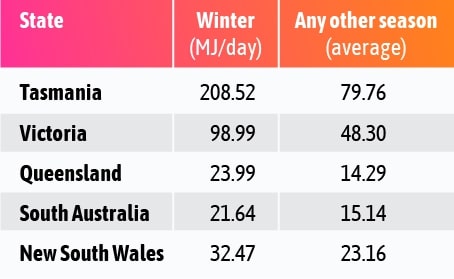Depending on where you live, you may have already turned on your heating. Most of Victoria has experienced the first couple of days of winter chill for 2021.
While we all know that winter is coming – as it does every year around now – it’s understandable that we’re somehow never quite prepared when it really hits. Something to do with the recency effect and how the comfort of spring and then summer makes us forget what happened 12 months prior.
That may also go some way to explaining why many people are surprised, some to the point of being shocked, when their gas bills rise.
So, here are some answers to the annual FAQs we get around wintertime:
Why am I using more gas?
Any household that uses gas, uses more when it’s cold. The most common gas appliances in Australian homes are gas heaters, gas hot water systems, and gas cooktops. Not surprisingly, the colder the weather, the more we use gas heating. Your gas hot water system is also likely to be doing more work.
How much more gas might I be using in winter?
This depends on where you live, however, consultancy firm ACIL Allen has provided some figures that give a decent guide. For a one-person household in Victoria, daily gas usage in winter is pretty much double the average per day for the other nine months of the year. Of course, Tasmania tops the chart.

These figures are from 2018 and have been calculated by 90-day periods.
Can I reduce my gas usage in winter?
This is certainly worth a try. You might be heating rooms that you hardly occupy. You might have your heat on a higher setting so you can walk around in shorts and a t-shirt. You might be losing heat under doors and through uncovered windows. Our post The (almost) A to Z of saving on your gas bill offers a pretty good checklist.
How is my gas bill calculated?
Your house, unit, or apartment has a meter that records the gas flowing through it. Regular meter readings are taken. The difference between the latest meter reading and the previous one is the amount of gas you’ve used. We simply multiply the number of megajoules (MJ) you’ve used by the price per megajoule to calculate the bill for your household usage.
Could the meter be wrong?
It’s extremely rare for a gas meter to be faulty. It’s actually not a particularly complicated piece of technology, but rather a mechanical device that literally turns as gas passes through the pipe.
Can I double-check the reading myself?
Of course, when you receive your bill and see the meter reading, you can have a look at your meter. You will see that the figure on your bill is lower than the current reading you see, as you would have used some gas in the interim period. If you know when your meter is scheduled for a reading, you can check closer to the actual reading date.
Can I see how much gas I use?
You can certainly view your meter at any time to better understand your actual usage. For example, have a look at the start and end of a ‘typical’ summer week and record the difference between the start and end figures to get your usage for that week, then do the same for a week in winter. You might be surprised to see how different a winter week is from a summer one.
What’s the difference between an actual read and an estimate?
GloBird uses estimates for many reasons, mainly because we bill monthly but normally get actual reads every two months. Estimates are a mathematical guess based on your previous usage data. This might mean you pay a bit less than you should, if the estimate is lower than what an actual read would have indicated, or you might pay a bit more, in a case where the estimate is higher. However, the difference will be made up (either way) when we get the next actual read. At worst you paid for some gas a little early.
If you think our estimates are amazingly accurate, thank you for the compliment. We put a lot of work into the algorithm we use. If you are a little sceptical of estimates, that’s okay, we get it. You can always provide us a self-read by taking a photo of your meter if you like. However, if we are getting regular actual reads every two months, you will probably find things work out about the same. One of the great things about such simple mechanical meters is that you can literally see the usage that is recorded with your own eyes.
Could I have a leak?
If you have a leak on your side of the meter, the meter records it as usage. The meter will still accurately measure how much gas has flowed through it. If your bill is high and you suspect a leak, perhaps go through the 14 points on our checklist in the post Are you worried you’re using too much gas? first.
Is there any more information?
You might be interested in the four questions we have answered and/or the two video explainers we’ve provided on our page: Estimating your bill. The questions we answer there are:
- What is bill shock?
- Can an estimate read cause bill shock?
- What if an estimate is wrong?
- Do I have to pay for leaked gas?
The videos explain how your gas meter is read and how your gas meter reading is estimated.
You can be assured that we’ll continue to do everything we can to keep you well informed while providing you with the best service we can.
We want you to be warm and comfortable throughout the colder months, but we also want you to feel comfortable that your bill is accurate and reasonable, based on your usage.
